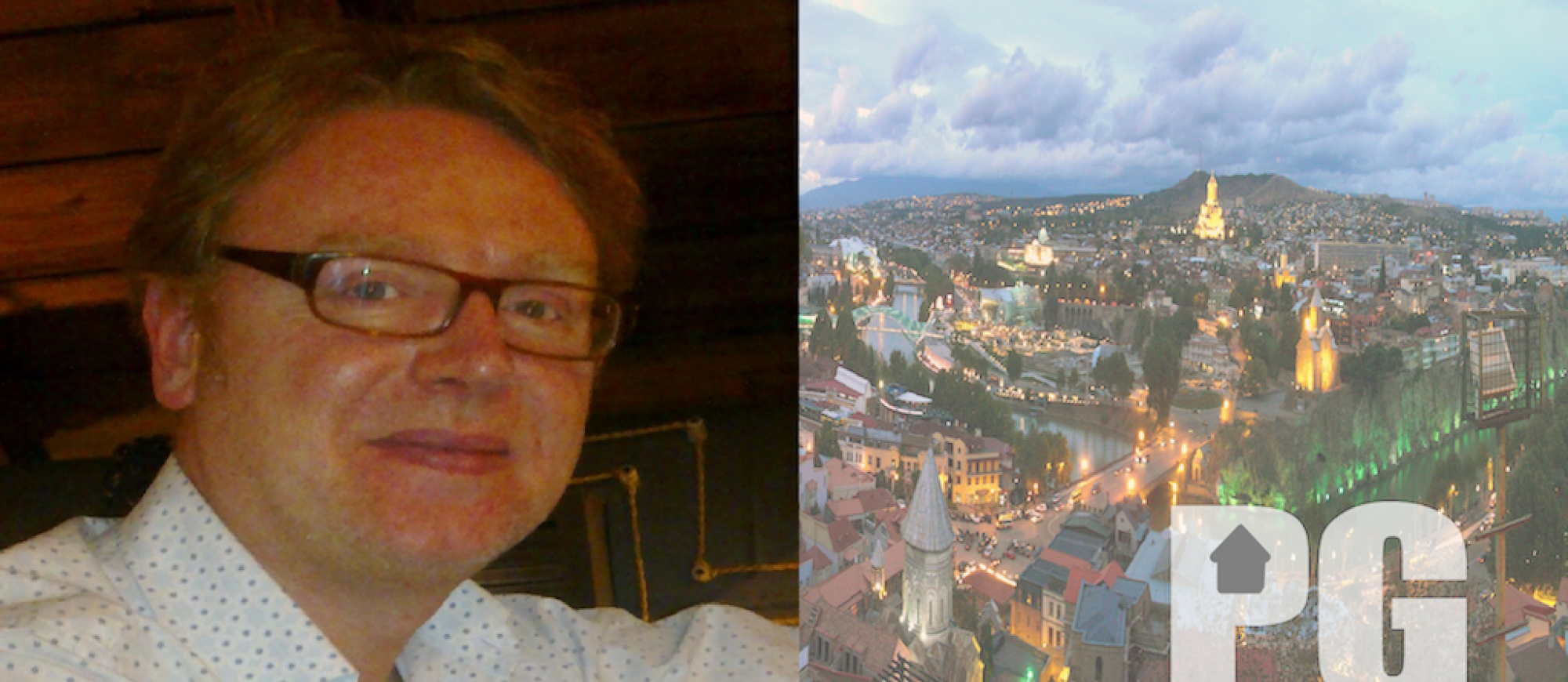By Kate Tabatadze
Tbilisi will have a general development plan by April, 2017. What change will the document make in the capital city? - Martijn Kanters Team Leader Urban Economics & Real Estate for City Institute Georgia has the answer.
- Next year Tbilisi is going to have its so longed General Land Use Plan. How economically beneficial is it going to be for the city?
General Land Use Plan will make a big change in Tbilisi. Real estate sector is an accommodator for economic development. Georgia’s economic growth is expected 3-4% in the coming years while this indicator has been average 10% annually for Tbilisi the past 10 years.
After doing economic analysis we came up with low-middle scenario where we forecast economic growth in Tbilisi between 6-8% a year average. This forecast is based on the city’s competitiveness aspects, which are in bad shape.
There are two indicators that determine urban competitiveness: Human Capital and Quality of Life. In the 21st century the main challenge for the city is to develop, attract and retain productive people-it’s all about people! It’s not so much about the companies any more. If you look at the employment growth in Tbilisi, 5-10% are self-employed people-and by 2030 we expect this figure to reach up to 20% like we have in many European countries today. As for the unemployment rate, it remains high-22%. Still, bigger problem is that we have a very low percentage of active population in Tbilisi-37.5% of total population. Urban planning cannot deal with this but we can deal with other aspect- Quality of Life. The number of tourist overnight stays per capita is one way how this indicator can be measured. We benchmarked this for all the cities in Central and Eastern Europe. Prague turns out to be the most attractive city with tourist overnight stays exceeding 10 million, while in Tbilisi this indicator is 2 million. However, we see potential here since it’s a big increase from 0.5 million in 2009. Vilnius, Riga and Bratislava have 4 million tourist overnight stays and Tbilisi can get there-it’s completely realistic in 15 years. Quality of life is a very important factor to determine economic growth in a contemporary world. Everybody’s afraid that if we have visa-liberalization with Europe and Georgia will continue to move close to European Union, lots of Georgians will leave the country unless we manage to make this country more attractive. We are still optimistic, realistic optimistic. But it’s time for a reality check.
Everything in the new General Land Use Plan is forecasted until 2030. So, we’re looking 15 years in the future. If everything goes right by that time, economically speaking, Tbilisi will be in the place where cities like Sophia and Vilnius are today. Georgia is a very politicized country and things can go wrong here, this is the trick. It’s important to create a system to guarantee a long-term stability, not everything has to depend on politics, take the politics out!
- If we look at the industrial market, what can you say is right and wrong about it?
In Tbilisi we have more than 2000 hectares of industrial land. According to our latest estimates, only 1200 hectares are more or less used and approximately 800 hectares are left vacant.
If we measure industrial land vs population density, the worst district in Tbilisi would be Didube where Industrial Land Pressure Indicator (ILPI) is 15 time more than in an average Tbilisi district, lots of people are leaving in a small area here- almost 8500 people per sq.m. What we are proposing, based on this analysis, is that total demand for commercial usage of all spaces(industrial, commercial, office, public, etc.) be rezoned-450 hectares total, 80% for green space public areas and small percentage for constructions.
- More concretely, how will this rezoning work for green areas?
Accessibility to nature and public spaces is a big problem in Tbilisi. We are talking about a massive increase in public green areas. In theory, the whole area of Tbilisi is a little bit more than 500 sq.km and built up area is half of that, so we must have lots of green space and this green space is very poorly accessible for people. You have few options in Tbilisi: Turtle Lake, Mtatsminda Park and Botanical Garden and you always have to take a taxi, you cannot just walk to get there. So, the issue here is not just the green areas but the accessibility to them.
In Didube district, which performs worst in regards to ILPI as mentioned above, construction of a big central park is planned. People need to breath.
- Does the General Land Use Plan envision making Tbilisi a walkable city?
We call it a walkable urbanity and it’s a very important aspect of an attractive and competitive city. You need to be able to walk. Tbilisi is a terrible city for walking and this has to be improved both in the city center and in districts. This is crucial.
- As for the infrastructure and transportation, what’s your view on Tbilisi Railway Bypass project?
The weak link here is that there are no options that could be economically feasible. Railway relocation is a huge project and it’s very expensive, I’ve been involved in a few of them in Europe. If you want to make them work economically you have to construct a lot of real estate. In Prague I was working on a railway project where we could build 1.2 million sq.m. In Tbilisi, total demand until 2030 for all commercial real estate will be around 900 000 sq.m-so we could do one big project and that’s it - and that would be wrong. We simply cannot do huge projects in Tbilisi.
- But we do. What about Panorama project?
When Co-Investment Fund wants to invest 500 million USD in the city center that is good news but should they do it that way? I would prefer them to act like a real Co-Investment Fund and not an Investment Fund. We need many small projects in Tbilisi rather than a few big ones. We suggest creating Special Intervention Zones, this way we identify strategic points in the city, stimulate it and the investment will spill over the surrounding area. Tbilisi does not need big buildings.
- Are there some crucial changes for retailers?
I’m proposing strong limitations in retail sector. It’s the biggest employer in the city and it’s in a very dangerous situation. I had same issues in other cities worldwide, telling shopping center developers to let go of the traditional model. In Tbilisi spending power on fashion is small, otherwise Tbilisi Mall would be full and what we see is that two floors there are still empty. As for East Point, it’s new and we need to give it some time. We have oversupply of fashion retailers in Tbilisi, with so many fashion brand shops only Zara and Massimo Dutti are performing well and they keep the whole group alive. What you buy here costs half price in Europe. In Prague we had the same issue and they just stopped developing large shopping centers. In Tbilisi we have Tbilisi Mall, East Point and the future Gallerea Tbilisi project-this starts to affect the traditional street shopping. You can see shops leaving Chavchavadze Avenue, Rustaveli Avenue and instead new restaurants pop up there, which is logical. Pekini Street has a very uncertain future. Also, we have Tbilisi Central, Katvasvla, GTC-what is going to happen with old shopping centers? How should they reposition themselves? Definitely not with fashion shops. We need to protect retailers and what I suggest is that any big retail development, with more than 5000 sq.m, should be accompanied by a mandatory feasibility study.
As said, for fashion retail, we are on the limit already while the expansion potential we may have is in small supermarkets.
- What about office spaces?
It’s a less complicated story. In Tbilisi we have about 10sq.m per office employee. We anticipate annual demand on office space in the range of 15-20 000 sq.m. It’s important to note that offices of the future will be very different, they will be smaller and very strongly connected with other functions, such as hospitality, Merani shopping mall is one of the best developments to me. It’s almost fully leased.
We have a number of business people coming from different countries who do business here, but are not based in Tbilisi. These people do not need huge offices, what they need is more short-term offices.
- Last but not least, tell us about the hotel sector in the city’s capital? What’s the story?
With all these new hotels coming, next year will be a big year for Tbilisi hotel market. Today occupancy rate is still sky high-75%, but it will go down in the coming years. Hotel operators should get prepared that rates will also go down, maybe down to the average European rates. Hotel accommodations in Tbilisi today are very expensive.
Finally, it is important to note that a better and stricter General Land Use Plan will contribute to the city’s economy and real estate market. Stronger protection of existing assets will contribute to the formation of a real estate investment market and limiting the currently huge supply of development land will direct development to strategic locations and have an upward effect on land prices.




